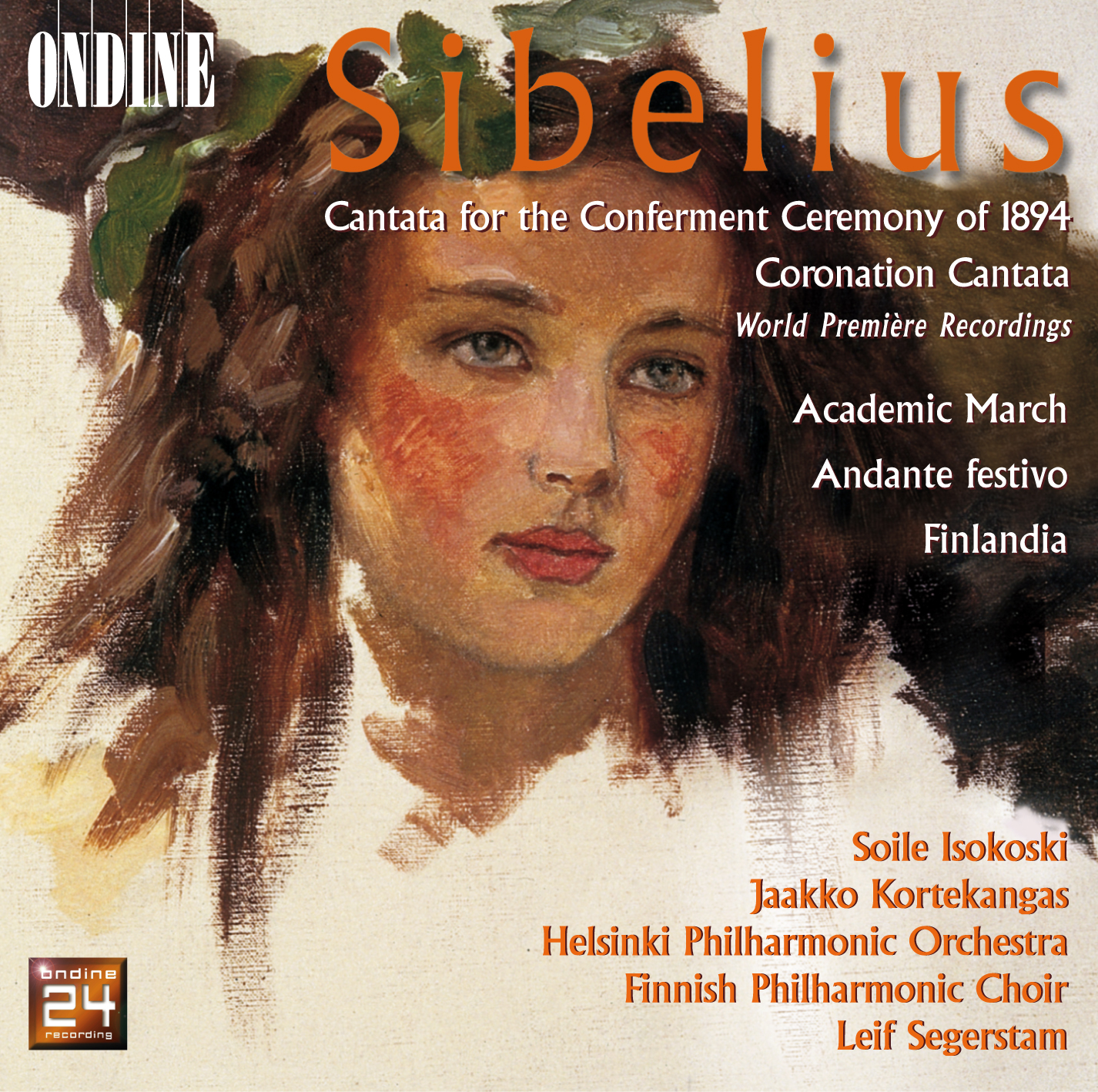Graduating or being Coronated?
Sibelius might be the man to do the job!
These two occasional cantatas were written shortly after Sibelius' great choral symphony Kullervo, thus it is interesting to hear what the composer does with voice following that monumental work.
Each cantata contains two movements, with only the 1894 cantata using vocal soloists, saved until its finale. There is more of the divine in the Cantata for the Conferment Ceremony of 1894's first movement, deepened by the opening a cappella choral moments, and a curious partial quotation of the hymn ST. ANNE or 'O God, Our Help in Ages Past'. There are plenty of orchestral interludes too though, where the general feeling I receive from this opening is of pious devotion and eventually ecstatic worship.
The much longer second movement is a different story. Here, I am reminded of Vaughan Williams' A Sea Symphony, a work still another decade off. Of course, the raising of the Finnish mythological figure Väinämöinen plants this music directly onto that country's past. The music builds and builds, allowing both soprano and baritone soloists separate ululations, eventually reaching an ultimate final vocal/choral/orchestral spectacle in the form of a concluding swinging march.
I should mention Osmo Vänskä's performance on BIS adds a third-movement scrap of this cantata, but without the solo soprano it was meant for, just with orchestra alone. Here on Ondine, Soile Isokoski (who has her own set of Sibelius Orchestral Songs) and Jaakko Kortekangas tackle the vocal dramatics with plenty of fervor.
One detects more of the secular in the Cantata for the Coronation of Nicholas II, bearing a solid militaristic quality in the form of hefty brass features amidst plenty of percussion. Instead of wall to wall choral singing with the orchestra relegated to the background, it is great to hear Sibelius give the instrumentalists plenty to do, plus more colors and textures for the listener to grab onto and enjoy. The second movement offers more complex choral textures, but not in a way which recalls Bach or Mendelssohn; instead Sibelius remains true to his paean to Finland.
The Finnish Philharmonic Choir are strong, if not particularly the finest of symphonic choirs. This could be merely a recording balance or ensemble numbers issue, and really this is only in comparison with the very finest symphonic choirs. Otherwise, I enjoy their beautiful sound and hearty dedication to this rare choral music.
The orchestra continues on by themselves in three shorter orchestral numbers. The Academic March is more idyllic sounding than the title suggests, preferring gentle pastoral textures and colors than anything militaristic or dustily academic. Leif Segerstam's Andante Festivo is the fastest I know, although its music simply flows ahead, while the Finnish conductor retains the soft hymn-like atmosphere.
Conversely, Segerstam's Finlandia is one of the longest timed performances I am familiar with. Only Herbert von Karajan and Zubin Mehta have even longer recorded versions. The opening portion is where Segerstam pulls back the most, relishing the growly crescendos and wind and string features. He is also rather devotional during the famous Finlandia Hymn, but switches admirably for the louder, brash moments. While the liner notes specifically mention Sibelius preferred a slower approach to Finlandia, I greatly enjoyed Osmo Vänskä much swifter view of the work recently.
I am always delighted at the wonderful string sound which follows Leif Segerstam around his recordings. I don't know if this is a result of a Finnish orchestra tradition, Segerstam's influence on the ensembles he works with, or the sonic attributes of Ondine, Naxos, Chandos, and BIS whom the conductor has most oft recorded with over the years. Regardless, it doesn't matter if the music is from Beethoven or Sibelius, the orchestral sound is always luscious, as it is here.
Works
Cantata for the Coronation of Nicholas II, JS 104 (17.13)
Cantata for the Conferment Ceremony of 1894, JS 105 (24.14)
Academic March, JS 155 (3.40)
Andante Festivo, JS 34b (3.44)
Finlandia, op. 26 no. 7 (9.16)
Soloists
Soile Isokoski, soprano
Jaakko Kortekangas, baritone
Performers
Finnish Philharmonic Choir
Helsinki Philharmonic Orchestra
Leif Segerstam, conductor
Label: Ondine
Year: 1999
Total Timing: 58.46
The main draw here are the rare cantatas from Sibelius, although unsurprisingly, Osmo Vänskä has also recorded them on BIS.
Inessential - yes.
Worth hearing - yes.
Played wonderfully - yes!
The three shorter orchestral works are more makeweights, so it may come down to pairings. I like that Ondine gathers them both together in their typically lovely sound.


Comments
Post a Comment